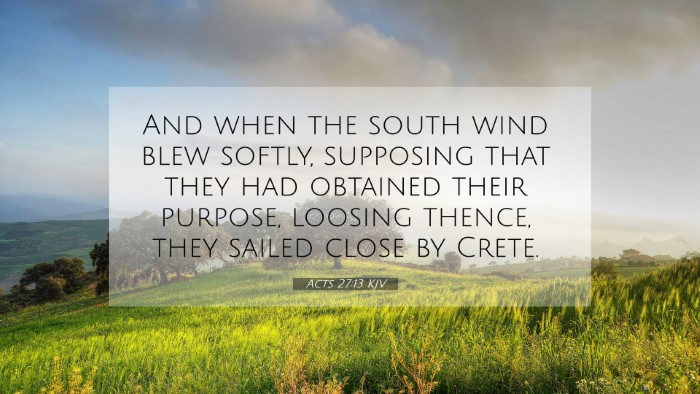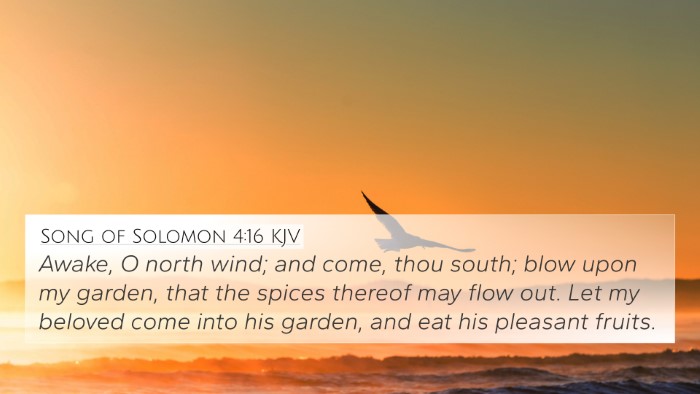Understanding Acts 27:13
Acts 27:13 states: “When the south wind blew softly, supposing that they had obtained their purpose, loosing thence, they sailed close by Crete.” This verse captures a pivotal moment in the Apostle Paul's journey as he navigates both physical and spiritual challenges. Below is a summarized interpretation based on insights from public domain commentaries by Matthew Henry, Albert Barnes, and Adam Clarke.
Contextual Background
This passage occurs during Paul’s journey to Rome, where he is a prisoner. The ship's crew, misled by favorable winds, believes they can safely set sail despite previous warnings of dangerous conditions ahead.
Key Themes and Insights
- Misguided Confidence: The sailors' assumption of favorable weather reflects human tendencies to trust in visible signs rather than seeking divine guidance. As observed by Matthew Henry, this can serve as a caution against taking risks without prayerful consideration.
- Divine Providence: Albert Barnes notes that God’s providence is at work, even in moments of apparent success. The soft winds may symbolize temporary relief but can lead to peril if not guided by God’s wisdom.
- Human Fallibility: Adam Clarke highlights the tendency to overlook warnings. Just as the sailors overlooked Paul’s cautions, so too do people commonly ignore the counsel of seasoned believers, leading to avoidable trouble.
Bible Cross-References
Acts 27:13 can be connected to various other scriptures that highlight similar themes of divine guidance, human error, and the complexities of God's plan:
- Proverbs 3:5-6: "Trust in the LORD with all your heart and lean not on your own understanding." This verse underscores the importance of divine trust over human conviction.
- Romans 8:28: "And we know that in all things God works for the good of those who love him." This verse echoes the idea of God’s overarching plan amid chaotic circumstances.
- Jeremiah 10:23: "I know, O Lord, that the way of man is not in himself: it is not in man that walketh to direct his steps." This highlights human limitations in making decisions without God’s guidance.
- Matthew 7:24-27: Jesus’ parable of the wise and foolish builders speaks to the importance of acting on God’s words amidst life's storms.
- 1 Corinthians 10:12: "Wherefore let him that thinketh he standeth take heed lest he fall." A reminder that confidence without caution can lead to downfall.
- Philippians 4:6-7: "Do not be anxious about anything..." emphasizes turning to God in every situation, contrasting the sailors' misplaced confidence.
- Psalm 37:5: "Commit your way to the LORD; trust in him and he will do this." This reinforces the trust in God’s governance over life’s decisions.
Thematic Connections
The connections between these verses and Acts 27:13 reflect broader Biblical themes of faith, guidance, and the consequences of human actions. When exploring the connections between Bible verses, one can discover a rich tapestry of teachings about reliance on God amidst uncertainty.
Tools for Deeper Study
To further explore these cross-references and connections, consider utilizing the following tools:
- Bible Concordance: A valuable resource for locating specific verses and their themes.
- Bible Cross-Reference Guide: Helps in navigating links between verses and topical studies.
- Bible Chain References: Utilize chain references for thematic explorations across the Scripture.
- Comprehensive Bible Cross-Reference Materials: Available tools that enable deeper investigation into thematic parallels across the Bible.
Conclusion
Acts 27:13 serves as an essential reminder of the need for divine wisdom in decision-making. The insights from public domain commentaries emphasize the importance of being aware of how easy it is to misinterpret signs in our lives. The cross-referencing of related verses deepens our understanding of the interconnectedness of Scripture, enriching our faith journey.






